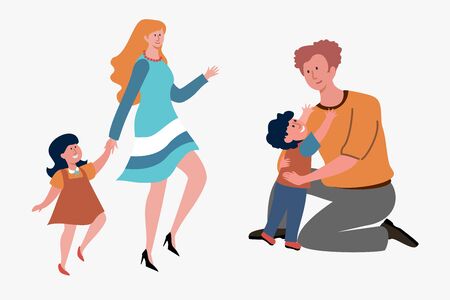Introduction to EYFS in the UK
If you are a parent or carer in England, you have probably heard of the Early Years Foundation Stage, often called EYFS. But what exactly is it, and why does it matter so much for our little ones? The EYFS is a statutory framework that sets the standards for learning, development, and care for children from birth to five years old. Introduced in 2008 and regularly updated to reflect the latest research, this framework aims to give every child the best possible start in life. It covers nurseries, pre-schools, childminders, and Reception classes in primary schools across England.
The EYFS was developed by bringing together previous early years guidance and practice, creating a unified set of principles that everyone working with young children must follow. Its roots stretch back to the government’s commitment to improving outcomes for all children, ensuring that no matter where they live or their background, every child has access to high-quality early education. This is particularly important in the UK, where reception year forms an essential bridge between nursery and formal schooling.
So why is EYFS so significant? Research shows that the first five years of a childs life are critical for brain development, social skills, language acquisition, and emotional well-being. The EYFS framework ensures that children experience rich learning opportunities through play-based activities while being supported to develop as confident individuals. By focusing on both academic skills and personal growth, EYFS helps lay strong foundations for future success at school and beyond—a goal every family can relate to!
2. Core Principles and Areas of Learning
The Early Years Foundation Stage (EYFS) in the UK is built upon a framework that ensures children receive quality early education, nurturing their development holistically. At its heart are four guiding principles, which shape every aspect of teaching and learning for children in Reception and other early years settings. These principles work hand-in-hand with seven key areas of learning, providing both children and practitioners with a clear pathway to support growth, curiosity, and independence.
Four Guiding Principles of EYFS
| Principle | Description |
|---|---|
| Unique Child | Every child is recognised as an individual who is constantly learning and can be resilient, capable, confident, and self-assured. |
| Positive Relationships | Children learn to be strong and independent through warm, nurturing relationships with adults and peers. |
| Enabling Environments | Children thrive in environments that respond to their individual needs and interests, encouraging exploration and discovery. |
| Learning and Development | All aspects of a child’s experience are interlinked, supporting holistic development through play-based learning. |
The Seven Areas of Learning Explained
The EYFS divides learning into seven interconnected areas, which help practitioners plan activities that cater to childrens overall growth. These areas are split into three Prime Areas and four Specific Areas:
| Prime Areas | Description |
|---|---|
| Communication and Language | Developing speaking, listening, attention skills, and understanding language within everyday interactions. |
| Physical Development | Encouraging movement, coordination, health, self-care, and fine motor skills through active play. |
| Personal, Social and Emotional Development (PSED) | Nurturing confidence, resilience, social skills, emotional wellbeing, and positive relationships. |
| Specific Areas | Description |
|---|---|
| Literacy | Introducing reading and writing through stories, rhymes, mark-making, and phonics activities. |
| Mathematics | Exploring numbers, shapes, patterns, measuring concepts in practical situations. |
| Understanding the World | Learning about communities, technology, nature, cultures—encouraging curiosity about the wider world. |
| Expressive Arts and Design | Fostering creativity through art, music, movement, role-play, and imaginative activities. |
The Impact on Children and Practitioners
Together, these principles and areas create a rich tapestry for early years education in the UK. For children, it means a supportive environment where play leads to meaningful learning experiences—whether they’re retelling a favourite story or building dens outdoors. For practitioners—including teachers and key workers—it offers a clear structure for observing progress and tailoring activities to each childs unique journey. By keeping these core elements at the forefront of daily practice, EYFS ensures that every child has the best possible start to their educational adventure.

3. How EYFS Shapes Reception and Early Years Settings
The Early Years Foundation Stage (EYFS) framework is at the heart of early years education across the UK, providing a clear structure that shapes the daily experience for children in Reception classes, nurseries, and pre-schools. By setting out the standards for learning, development, and care from birth to five years old, EYFS ensures that every child receives a consistent, high-quality start to their educational journey.
Enriching Environments
One of the most visible ways EYFS influences early years settings is through the creation of stimulating environments. Classrooms and play areas are carefully designed to encourage exploration, independence, and curiosity. You’ll find cosy book corners, sensory play zones, and inviting outdoor spaces – all thoughtfully arranged to promote free choice and active learning. These environments reflect British values of inclusivity, safety, and respect for diversity, ensuring every child feels welcome and valued.
Daily Routines That Foster Growth
EYFS also guides practitioners in establishing daily routines that balance structured activities with plenty of time for child-initiated play. A typical day in a Reception class or nursery might include circle time for sharing news, hands-on phonics sessions using British storybooks, snack times promoting healthy eating habits, and outdoor play regardless of the weather – wellies at the ready! These routines help children develop social skills and confidence within a predictable yet flexible framework.
Nurturing Relationships
Central to the EYFS approach is the importance of positive relationships. Practitioners act as key persons, forming secure attachments with children and building strong partnerships with parents. Communication is open and supportive – whether it’s sharing a “Wow moment” from the day or involving families in stay-and-play sessions. This collaborative spirit reflects the UK’s emphasis on community engagement and parental involvement in early education.
Putting It All Together
Through these practices shaped by EYFS – rich environments, purposeful routines, and nurturing relationships – early years settings in the UK offer children an engaging start that lays solid foundations for lifelong learning. Parents can feel confident that their child’s unique needs will be recognised and supported every step of the way.
4. Assessment and Progress within EYFS
Assessment is a fundamental part of the Early Years Foundation Stage (EYFS) in the UK, guiding teachers and practitioners in supporting each childs unique learning journey. The approach is designed to be both formative and ongoing, with a strong focus on observation, collaboration with parents and carers, and meaningful reporting. Lets explore how assessment is woven into daily practice, ensuring all children are supported to thrive during their Reception year and beyond.
Observation: Everyday Moments Matter
Practitioners in Reception classes and early years settings use regular observations as the cornerstone of assessment. These observations are often informal and take place during play, group activities, or routine moments such as snack time. By watching how children interact, solve problems, communicate, and explore, practitioners gather invaluable insights into each childs development across the seven areas of learning.
Types of Observations Used
| Type of Observation | Description |
|---|---|
| Anecdotal Notes | Brief written records of significant moments or achievements |
| Photographs & Samples | Visual evidence of childrens work or activities |
| Learning Stories | Narrative accounts highlighting progress over time |
| Checklists & Trackers | Tools for monitoring specific skills or milestones |
Assessment: Ongoing and Individualised
The EYFS framework emphasises that assessment should be holistic and tailored to each child’s needs. Practitioners use their observations to assess how children are progressing towards the Early Learning Goals (ELGs). This process is not about formal testing but about understanding what children know, can do, and what interests them. Practitioners will often plan next steps based on these assessments, ensuring learning experiences remain relevant and engaging.
Main Assessment Practices in EYFS Settings
- Formative Assessment: Continuous observation informs day-to-day planning.
- Summative Assessment: At key points (such as the end of Reception), practitioners summarise each child’s achievements in relation to the ELGs.
- The Reception Baseline Assessment (RBA): A short, interactive assessment carried out in the first six weeks of Reception to establish a starting point for each child.
- The EYFS Profile: A statutory summary of children’s attainment at the end of the Reception year, shared with parents and Year 1 teachers.
Reporting Progress: Keeping Families Involved
An essential aspect of EYFS assessment is keeping parents and carers informed about their childs progress. Practitioners share updates through informal chats at drop-off or pick-up, regular parent meetings, and written reports like the EYFS Profile. These conversations celebrate childrens achievements and discuss any areas where extra support may be needed. Working together ensures a holistic view of each childs development and strengthens the vital home-school partnership.
5. Parental Involvement and Home Learning
Parental involvement is at the heart of the Early Years Foundation Stage (EYFS) approach in the UK, and it’s widely recognised that parents are a child’s first and most enduring educators. By actively engaging with your child’s early learning journey, you not only support their development but also help to create a seamless link between home and school life. Schools and nurseries across the UK encourage regular communication with parents, whether through daily chats, learning journals, or special stay-and-play sessions.
Building Strong Partnerships with Schools
Working in partnership with your child’s school or nursery is fundamental under EYFS. Teachers value insights from home—your observations can help shape planning for your child’s learning. Many settings host parent workshops on topics such as phonics, early maths, or language development, giving you practical tips to use at home. By attending these sessions or engaging in regular conversations with staff, you show your child that learning matters both at home and in school.
Home Learning Ideas That Support EYFS
You don’t need fancy resources to bring EYFS principles into everyday life. Simple activities like reading bedtime stories, counting out fruit at snack time, or singing nursery rhymes all contribute to the seven areas of learning and development. Baking together builds maths skills; gardening fosters understanding of the world; drawing and painting encourage expressive arts. The key is making learning playful and part of family routines.
Celebrating Progress Together
Celebrating small achievements—whether your child has written their name for the first time or shared kindly with a friend—makes children feel valued and confident. Share these moments with teachers so they can be recognised at school too! This collaborative approach ensures each child feels supported by both their family and their educational setting, embodying the true spirit of EYFS in the UK.
6. The British Touch: Cultural Aspects in EYFS
One of the most delightful aspects of the Early Years Foundation Stage (EYFS) in the UK is how it gently weaves British values, traditions, and local context into daily learning experiences. This approach ensures that children are not only developing essential skills but also growing up with a strong sense of community and belonging.
Embedding Fundamental British Values
From the earliest days in Reception, children encounter the core British values of democracy, rule of law, individual liberty, mutual respect, and tolerance for different faiths and beliefs. These are not taught as abstract concepts, but explored through group activities like turn-taking games, voting for a storybook to read, or discussing classroom rules. Such experiences help young learners understand fairness, listening to others, and respecting differences—skills that are invaluable both within and beyond school walls.
Celebrating Festivals and Local Traditions
EYFS settings across the UK take pride in celebrating national events and local customs with children. Whether it’s donning red for Red Nose Day, making crowns for the King’s Birthday, or crafting poppies for Remembrance Day, these activities offer hands-on opportunities to connect with wider British culture. Children might also experience traditional foods during harvest festivals or learn about Bonfire Night by creating safe craft ‘sparklers’. Through such celebrations, little ones begin to appreciate their place in a rich cultural tapestry.
Exploring Local Heritage and Nature
EYFS practitioners often make the most of their surroundings by planning walks to local parks, visits to nearby landmarks, or even inviting community helpers like police officers and firefighters into school. These real-life encounters help children understand their local area and its history—whether it’s discovering how people travel around London or exploring ancient castles in Scotland. Outdoor learning is especially valued, reflecting Britain’s love for wellies-and-waterproofs adventures regardless of the weather!
Building a Sense of Belonging
The British approach to early years education goes beyond academics; it aims to nurture confident, curious children who feel rooted in their community. By thoughtfully incorporating British values, festivals, and local context into everyday activities, EYFS settings create an environment where every child can thrive—feeling safe, celebrated, and ready for the next steps in their learning journey.

